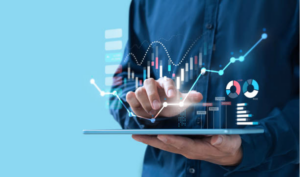Olympia Gonatidou is writing…
Accounting is a vital part of the business process and its main purpose is to record, analyse and interpret a company’s financial data. But how might it evolve over the next 10 years? Over time, accounting has adopted new technologies and methods that have influenced the way it works. In this article, we will examine the forecast of the evolution of accounting over the next decade and the impact of new technologies in this area.
Cloud Technology and Accounting: The evolution of cloud technology has had a positive impact on accounting. It provides the ability to store and access data from anywhere in the world, while facilitating the exchange of information between accounting systems. The next decade is expected to see increased use of cloud technology in accounting. Businesses will benefit from the flexibility and security offered by storing data on cloud servers, and will also be able to choose specialized cloud-based accounting software.
Automation and AI: Automation and artificial intelligence (AI) will have a significant impact on the accounting industry over the next 10 years. The use of AI algorithms will be able to process large volumes of data faster and more accurately than humans, reducing the risk of errors. Also, advances in AI will enable automatic identification and entry of transactions, saving time and resources.
Blockchain and Accounting: Blockchain technology is expected to have a significant impact on the accounting sector over the next 10 years. The blockchain is a distributed distributed ledger that securely records transactions. This technology can provide greater transparency, security and accuracy in recording and tracking financial transactions. The use of blockchain technology in accounting can eliminate the need for intermediaries and middlemen, as transactions can be executed directly between participants. This can reduce costs and simplify accounting processes.
Data Analysis and Intelligent Reporting: Data analytics will play a critical role in the evolution of accounting. The collection and analysis of large volumes of data can provide valuable insights into a company’s financial performance. In addition, the use of smart reporting is expected to increase over the next 10 years in the accounting sector. Smart reporting uses technologies such as machine learning and pattern recognition to analyze and present data in a readable format. This allows accountants and managers to quickly and efficiently derive information about a company’s financial condition and trends.
Security and Data Protection: With increasing digitization and the proliferation of cyber threats, data security and protection are becoming increasingly important in the accounting industry. Firms will focus on adopting advanced security measures, such as data encryption and access management, to protect their clients’ financial information. In addition, the implementation of the General Data Protection Regulation (GDPR) and other similar regulations will play a key role in ensuring the privacy of personal data and preventing breaches.
Changes to Accounting Rules and Regulations: Over the next decade, new accounting rules and regulations are expected to emerge that will impact the sector. Accounting standards bodies, such as International Financial Reporting Standards (IFRS), continue to evolve and adapt to the necessary changes and challenges of the business and economic environment. New accounting rules may be imposed to address issues such as revenue recognition, asset valuation and reporting on corporate sustainability and social responsibility.
In addition, artificial intelligence and automation are expected to have a significant impact on accounting in the next 10 years. The use of AI can automate routine accounting tasks such as document processing and transaction tracking, resulting in increased accuracy and saving time and resources for accountants.
Finally, the business reality is evolving dramatically, and this is also affecting the field of accounting. Businesses are facing new challenges, such as increased global competitiveness, changes in the way they operate and the need for innovation. Accountants and accounting professionals will have to adapt to these changes and look for new opportunities and ways of doing business.
- https://online.maryville.edu/blog/future-accounting/
- https://www.ifac.org/knowledge-gateway/preparing-future-ready-professionals/discussion/together-future-auditing-profession-talent-and-attraction-challenges-danish-auditing-profession
- https://www.mdpi.com/2227-9709/9/1/19- “Digital Transformation in Accounting: Current Trends and Future Implications”
- https://www.mdpi.com/2674-1032/2/2/15-“Emerging Technologies in Accounting: A Review of Recent Developments and Future Trends”






